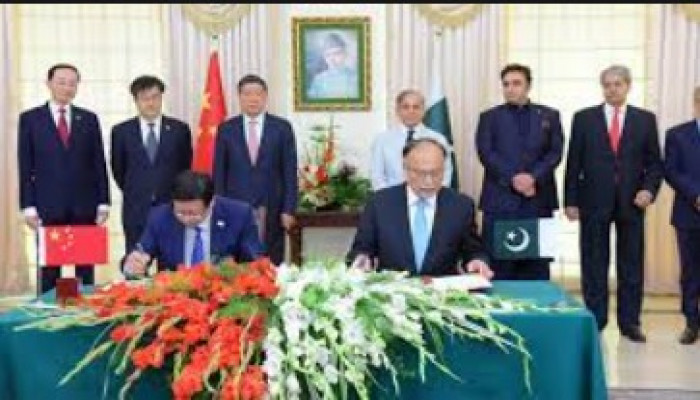Pakistan and China sign six MoUs under CPEC
- In Reports
- 06:27 PM, Aug 01, 2023
- Myind Staff
In a bid to bolster their cooperative efforts and advance the ambitious China-Pakistan signed six significant documents to strengthen and accelerate cooperation under the China-Pakistan Economic Corridor (CPEC), solidifying the enduring strategic relations between the two nations.
The signing ceremony, commemorating the 10-year milestone of the CPEC, was witnessed by Prime Minister Shehbaz Sharif and Chinese Vice Premier He Lifeng. The CPEC is a comprehensive initiative comprising infrastructure and other projects that have been under construction across Pakistan since 2013. It aims to connect Gwadar Port in Pakistan's Balochistan with China's Xinjiang province. However, India opposes the project, as it passes through Pakistan-occupied Kashmir.
Among the signed documents were agreements on the joint cooperation committee of CPEC and the establishment of an expert exchange mechanism within the framework of the project. Another document allowed for the export of dried chilies from Pakistan to China, while a fourth one dealt with the realignment of the Karakoram Highway Phase II project feasibility study.
In addition, both sides signed a Memorandum of Understanding (MoU) on the Industrial Workers' Exchange Programme through diplomatic channels and reached an agreement to promote the strategic ML-1 rail upgradation project.
During the occasion, Prime Minister Sharif highlighted the aim of these documents, which is to further enhance the economic relations between Pakistan and China. He emphasized that the CPEC has already attracted more than USD 25 billion of investment in various sectors in Pakistan, including power and hydel projects, road infrastructure, and public transport.
“We are now entering the second phase of the CPEC which will envisage investments in sectors such as agriculture and information technology,” he said.
Expressing unwavering commitment, he reassured that Pakistan stands ready to play its part in realizing Chinese President Xi Jinping's vision of a shared destiny of progress and prosperity. Confident in Pakistan's capabilities, he emphasized that the nation is determined to achieve self-reliance and economic growth.
“We will emulate the Chinese model of development to achieve peace and prosperity in the country,” he said, adding that Pakistan and China enjoy a unique relationship.
“We are all-weather friends, iron brothers and this friendship will continue and will not tolerate any obstacles in its way,” he said.
Earlier, the Chinese Vice Premier, a distinguished member of the Politburo of the Central Committee of the ruling Communist Party, arrived in Pakistan for a three-day trip to attend the celebration held at the completion of a decade of the China-Pakistan Economic Corridor (CPEC).
“Vice Premier He will attend the 10th-anniversary celebrations of CPEC and call on the President and the Prime Minister,” the Foreign Office earlier said.
Earlier, the visit by the Chinese Vice Premier comes at a crucial time when Pakistan narrowly escaped defaulting on its foreign obligations. China played a significant role in assisting the country by rolling over more than USD 5 billion in loans.
Originally envisioned as a USD 46 billion project, the China-Pakistan Economic Corridor (CPEC) later expanded to USD 62 billion, signifying its growing importance in bilateral relations.
The foundation for the CPEC projects was laid in 2013, with the formal launch taking place during President Xi Jinping's visit to Pakistan in 2015.
The Belt and Road Initiative (BRI), initiated by Chinese President Xi in 2013, aims to create an extensive network of land and sea routes linking Southeast Asia, Central Asia, the Gulf region, Africa, and Europe.
While the BRI is seen as an ambitious effort by China to enhance its global influence through infrastructure projects financed by Chinese investments, it has also sparked concerns regarding mounting Chinese debt in some smaller countries. For instance, Sri Lanka handed over its Hambantota port to China in a debt swap in 2017, agreeing to a 99-year lease, raising questions about the long-term implications of such arrangements.
Image source: BOL News







Comments